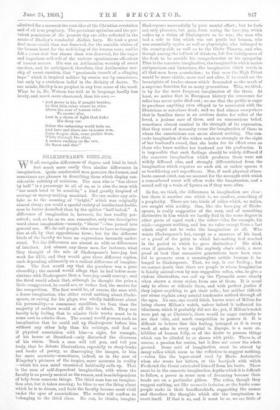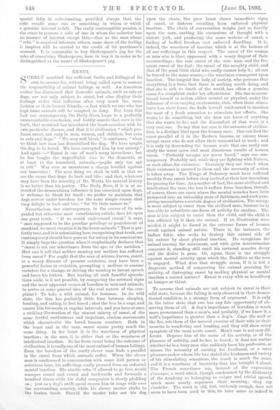SHAKESPEARE'S BEER-JUG.
WE all recognise differences of degree and kind in intel- lect much more easily than similar differences in imagination. Quite uneducated men perceive the former, and sometimes use phrases in describing them which display con- siderable subtlety of criticism. The man who is "too clever by half" is a personage to all of us, as is also the man with "too much head to be sensible," a kind greatly despised of average or money-making mankind. No one makes any mis- take as to the meaning of "bright," which was originally almost slang ; nor could a special variety of intellectual feeble- ness be better described than by the epithet "half-baked." A difference of imagination is, however, far less readily per- ceived; and, so far as we can remember, only one descriptive word about imagination—namely, "literal "—has passed into general use. We do call people who seem to have no imagina- tion at all, by that opprobrious term ; but for the different kinds of the faculty we have no expressions instantly under- stood. Yet the differences are almost as wide as differences of intellect. Ask almost any three men, for instance, what they thought of the sale of Shakespeare's beer-jug last week for WO, and they would give three different replies, each depending ultimately on a radical difference of imagina- tion. The first would say that the purchase was a pure absurdity ; the second would allege that he had better asso- ciations with Shakespeare than a beer-jug could convey ; and the third would admit that, although he thought the price a little exaggerated, he could see, or rather feel, the motive for the competition. The first would be, of course, the man with a dense imagination, who either cared nothing about Shake- speare, or caring for his plays, was wholly indifferent about his personality,—a commoner condition, we fear, than the majority of authors would at all like to admit. They can hardly help feeling that to admire their works must be in some sort to admire them. The second would possess such an imagination that he could call up Shakespeare before him without any other help than his writings, and• feel as if physical association with him—a sight, for example, of his house at Stratford—only disturbed the clearness of his vision. Such a man will tell you, and tell you truly, that he detests illustrations, especially to story-books and books of poetry, as disarraying the images, to him far more accurate—sometimes, indeed, as in the case of Kingsley's pictures of the tropics, more accurate in reality —which his own mind unassisted habitually calls up. That is the man of self-dependent imagination, with whom the faculty is as purely mental as the reason, and is as independent of help from concrete things. The third man has an imagina- tion also, but it takes rousing ; he likes to see the thing about which he is to dream, and feels the faculty become most vivid under the spur of associations, The writer will confess to belonging to the third class. He can, he thinks, imagine Shakespeare successfully by pure mental effort ; but he feels not only pleasure, but gain, from seeing the beer-jug, which wakes up a vision of Shakespeare as he was ; the man who had a side to him which was not poetic but human, who was essentially squire as well as playwright, who belonged to the country-side as well as to the Globe Theatre, and who, though among the loftiest of thinkers, felt few indulgences of the flesh to be outside his comprehension or his sympathy. That is the concrete imagination, the imagination which makes antiquarians and historians, the imagination which revels in all that men term association ; to that men the High Priest would be more visible, more real and alive, if he could see the breastplate of twelve stones which descended as the mark of a supreme function for so many generations. This, we think, is by far the most frequent imagination of the three. At least, we notice that in European history the reverence for relies has never quite died out ; we see that the public is eager to purchase anything even alleged to be associated with the illustrious or notorious dead ; and we find almost everywhere that in families there is an anxious desire for relics of the loved, a jealous care of them, and an unconscious belief, sometimes almost comical in the strength of its expression, that they must of necessity rouse the imagination of those to whom the associations can mean almost nothing. The con- crete imagination of the widow wakes so strongly at the sight of her husband's sword, that she looks for its effect even on those who knew neither her husband nor his profession. It is impossible that such feelings should be widely diffused if the concrete imagination which produces them were not widely diffused also, and strongly differentiated from the imagination which requires no such aid, or rather spurns it as bewildering and superfluous. Nor, if such physical stimu- lants cannot exist, can we account for the strength with which a remembered scent will often wake the imagination, and a sound call up a train of figures as if they were alive.
So far, we think, the differences in imagination arc clear.; but there is another one which is, we confess, something of a perplexity. There are two kinds of relics which, we notice, are sought with avidity. One, like the beer-jug of Shake- speare, is really suggestive of the man, and of something distinctive in him which we hardly find in the same degree in other poets of equal rank ; the other—like, for example, his stick—suggests nothing, and has no value except from a fact which ought not to wake the imagination at all. Who wants Shakespeare's hat, except as a measure of his head, or a proof of the point to which hat-making had reached in the period to which he gave distinction P His stick, even if genuine, is to us like anybody else's stick, a mere proof at best that successive generations have been care- ful to preserve even a meaningless article because it be- longed to Shakespeare. That, we say, is our feeling ; but we cannot doubt that there are people in whom imagination is faintly stirred even by non-suggestive relics, who, to give a violent illustration, can call up the Pyramids more clearly when shown a stone stolen from one of them. It is usual only to abuse or ridicule them, and with perfect justice if they injure anything to get their relic ; but neither ridicule nor abuse explain away mental tendencies noticed through all the ages. No one, one would think, knows more of Milton for being shown Milton's watch, unless indeed it indicated his blindness, which it probably did not do; yet, if Milton's watch were put up at Christie's, there would be eager curiosity to see that relic, and much competition to possess it. It is difficult to believe that this feeling, betrayed as it is every week at sales in every capital in Europe, is a mere ex- hibition of human folly, or of the desire to possess things which can be alluded to or shown with pride. There is, of course, a passion for curios, but it does not cover the whole ground. Some sort of imagination must be stirred by many relics which seem to the reflective to suggest nothing, —relics like the taper-stand used by Marie Antoinette when she wrote her letters, or the bootjack with which Frederick the Great extricated himself from his boots. There must be in the concrete imagination depths which it is difficult to follow, a power in some men of dreaming because their heads are on a particular pillow. The relics, though they suggest nothing, act like memoria technica, or the knots some people make in their handkerchiefs, suggesting the names and therefore the thoughts which stir the imagination to exert itself. If that is so, and it must be so, we see little of special folly in relic-hunting, provided always that the relic recalls some one or something in whom or which a genuine interest is felt. The really contemptible passion is the craze to possess a relic of one in whom the collector has no manner of interest except this,—that as the man whose 1 relic" is acquired interests others, some share of the feeling it inspires will be carried to the credit of its purchaser's account. It is reasonable to buy Shakespeare's jug for the sake of conceiving Shakespeare, base to buy it in order to be distinguished as the owner of Shakespeare's jug.



















































 Previous page
Previous page